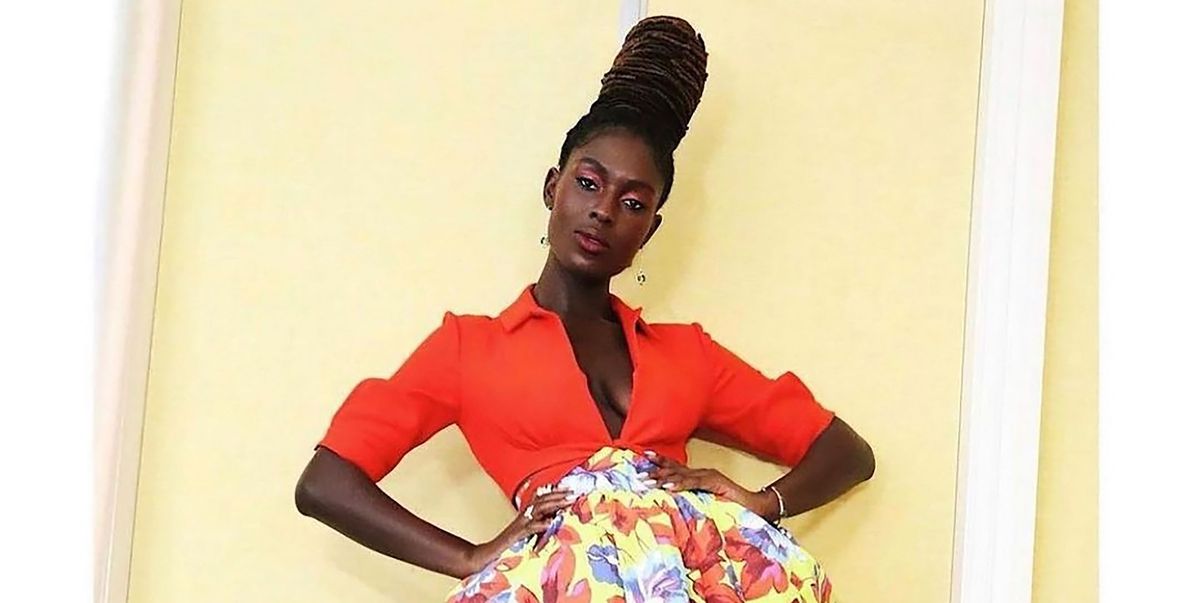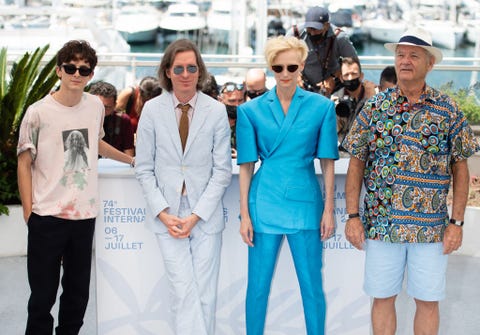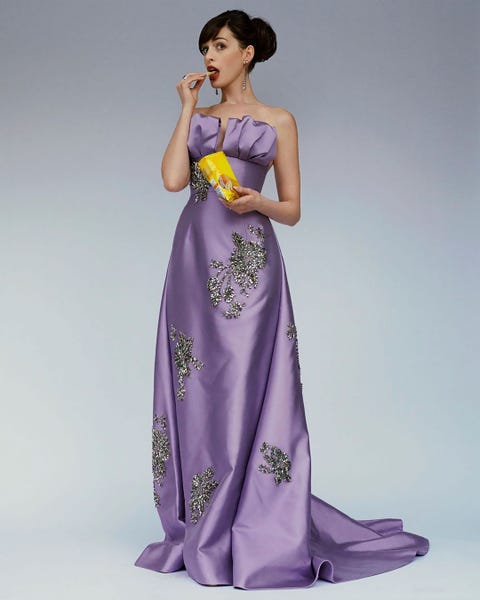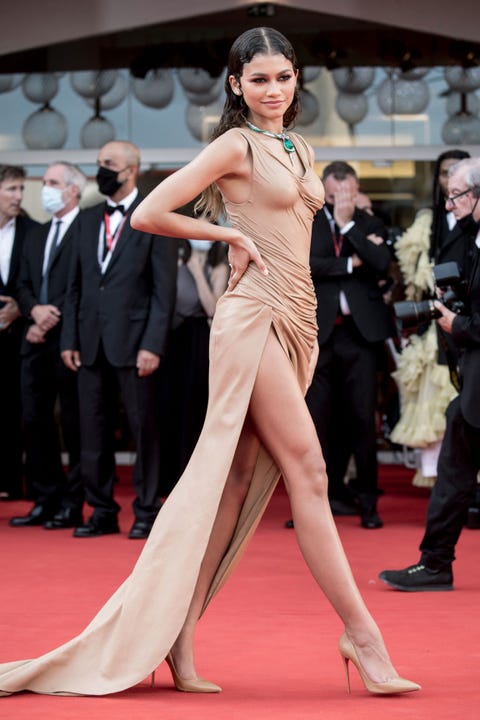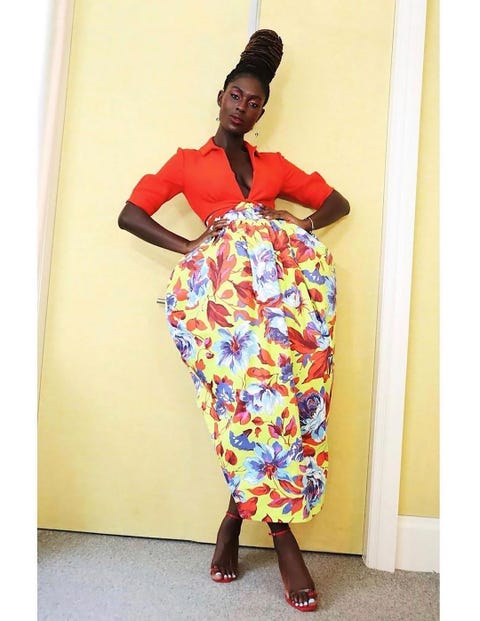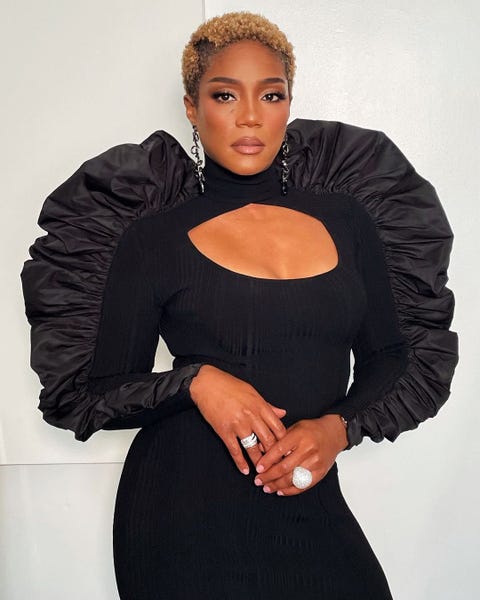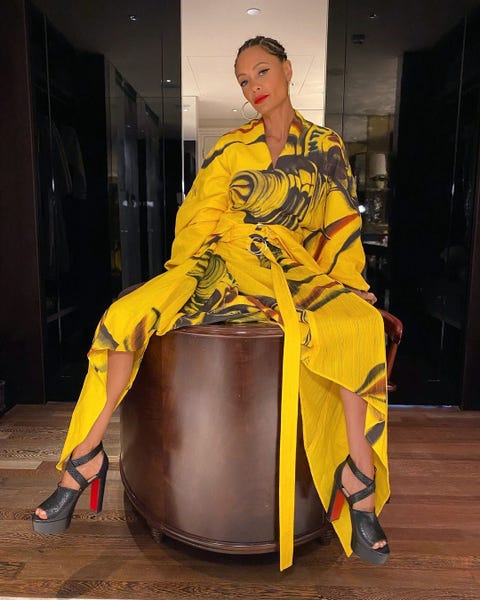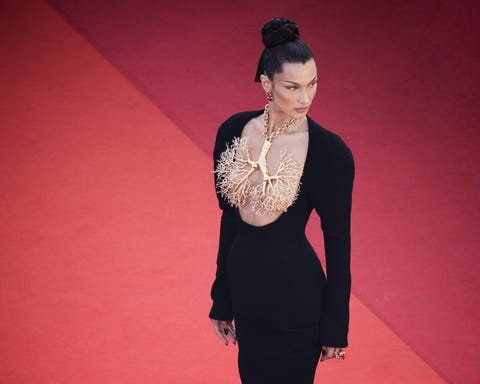It was the fashion moment seen—and memed—around the world. Framed by Cannes’ sunlit palms and sailboat masts, there they stood: Timothée Chalamet, Wes Anderson, Tilda Swinton, and Bill Murray, the art-house power squad from the recently released film The French Dispatch. Chalamet looked cool, as is his wont, in a graphic, anti-glam (and yet somehow very glam) T-shirt from Elara. Ever-eccentric Anderson wore preppy seersucker; Swinton, who can do no sartorial wrong, donned a snow cone-blue suit from Haider Ackermann. And Murray, ostensibly a boomer on vacation, brilliantly gave very little of a damn. Twitter went nuts, labeling the quartet, in order, “tiktok, twitter, instagram, fb.” (Or, to this writer’s satisfaction, “pitch, first draft, final proof, comments section.”)
The snapshot came as something of a catharsis and a capstone: IRL red carpet fashion was back! Yet, admittedly, looking a little different. The Cannes quartet was a glimpse at a hybridized new paradigm in which celebrities and stylists were playing across a wide range of cues, from the casual and Zoom-ified to the highest chords of electrifying chic. The risks celebrities and their stylists began taking while dressing within the bounds of a Zoom window seemed to have paid off with a new, more freewheeling approach to step-and-repeat style.
When virtual dressing became a hot topic last year, it evolved almost as quickly as the news cycle. There were plenty of stories about people dressing up, from the waist up, for digital meetings while wearing off-camera sweatpants. Eventually, however, a hunger for non-athleisure became more pronounced.
For the 2020 Emmy Awards, held virtually, the show’s producers sent a note to nominees with a dress-code prompt: “Come as you are, but make an effort!” That command is actually a pretty good way to contextualize the fresh outlook around the return of in-person, high-profile dressing (even if it’s still touch-and-go; at press time, COVID-19’s Delta variant was spiking).
Asked if the virtual advanced how she approaches the physical, celebrity stylist Elizabeth Stewart, who works with Viola Davis and Amanda Seyfried (and who styled this issue’s Women in Hollywood portfolio), says, “Once we got the hang of it, there was a lot of freedom in choosing looks for virtual red carpets.” Her implication was that all the screen time did, in fact, impact the manner in which in-person fashion is considered in 2021.
Jason Rembert, stylist to Lizzo and Issa Rae and the founder of the label Aliétte, echoes the position: “Virtual red-carpet fashion helped push the envelope. We had to work differently, utilizing photography, lighting, and backdrops to help create those red-carpet looks from our own confined spaces.” From a creative standpoint, he says, “it was beneficial for us all.” Nicola Formichetti, the stylist and creative consultant for Haus of Gaga/Haus Labs, says that those in his profession “had to become more resourceful in order to keep creating, but more importantly, keep inspiring.”
This year’s red-carpet looks feel enlivened by a refreshed, charged-up sense of dynamic liberty—with resultant confidence, ownership, openness, and often boldness—regardless of whether someone is going for the low-key, the high-wattage, or something in between. All that adaptation also seems to have emboldened wardrobe decision-making, with consistently joyous and optimistic outfits spotted from labels large and small.
At the 2021 Oscars, where a select few were permitted in person, Regina King gave us a full, butterfly-winged Louis Vuitton princess knockout courtesy of her stylists, Wayman Bannerman and Micah McDonald. It was the stuff of fashion fantasy. Formichetti praises Lil Nas X’s Richard Quinn and Andrea Grossi outfits at the BET Awards, which were styled by Hodo Musa, and Rina Sawayama’s turn at the BRIT Awards in frilly Balmain. Also at the BET Awards: Zendaya alighting in Versace—from spring 2003. (Her stylist is the renowned image architect Law Roach.) It was a version of the same dress Beyoncé sported to perform her song “Crazy in Love” at the same ceremony, also in 2003. All four examples illustrate that aforementioned 2020 Emmys directive: These people appeared true to their sartorial leanings, and all of them were absolutely serving.
“My clients are unapologetically searching for synergy,” says Solange Franklin Reed, who dressed her client Jodie Turner-Smith in vibrant Christopher John Rogers this past summer to promote her Anne Boleyn miniseries. “They’re emboldened to request the brands and, what’s newer, the specific teams that truly make them feel seen. I appreciate that we’re aligned on intentionality.”
As stars return to step-and-repeats (Zendaya in Balmain in Venice! Olivia Rodrigo in archive Versace at the VMAs!), so does the go-for-broke attitude they showed off on their virtual equivalents. Circling back to another Cannes standout, who could forget Bella Hadid? There, at the premiere of Tre Piani, she wore a Schiaparelli Haute Couture deep-U-neck black wool crepe dress designed by Daniel Roseberry. On top of it, her necklace—also by Roseberry—depicted lungs with golden, spindly bronchi and rhinestone-tipped alveoli. It was a striking, unforgettable image, due in part to the fact that one could extrapolate the respiratory visual as having greater resonance. When there’s been so much negative health-related news over the past year and a half, Roseberry inverted the gloom and made something beautiful of the body, worn to perfection by Hadid. In that one moment, it was sealed: This era’s red-carpet fashion is proving to be a breath of fresh air.
This article appears in the November 2021 issue of ELLE.
This content is created and maintained by a third party, and imported onto this page to help users provide their email addresses. You may be able to find more information about this and similar content at piano.io
